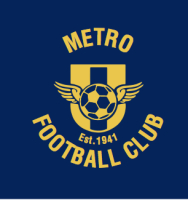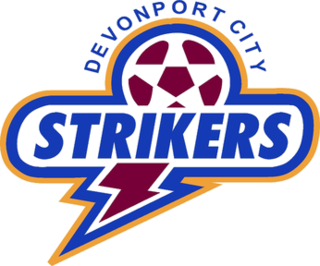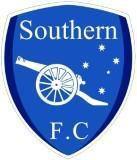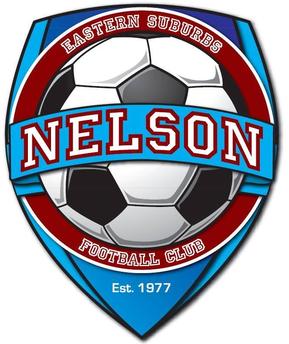Soccer in Tasmania describes the sport of soccer being played and watched by people in the state of Tasmania in Australia.
Football Tasmania (FT) is the governing body for soccer in the Australian state of Tasmania. The federation oversees competitions across Tasmania, Tasmanian representative teams, and development of the sport in the state. The federation was known as the Tasmanian Soccer Association until 1996, when it was renamed to Soccer Tasmania. In line with national changes in March 2006, it became Football Federation Tasmania. In February 2019, the organisation became simply Football Tasmania.

Metro FC is a football club formed in 1941 in the northern suburb of Claremont, Hobart, Tasmania. They play at North Chigwell Oval. It has a range of teams for all ages and genders playing in competitions run by the Football Federation Tasmania. Its teams range from under 7s right through to seniors. The teams' colours are yellow and blue.

Hobart City Beachside Football Club is an Australian semi-professional soccer club based in the suburb of Sandy Bay in Hobart, Tasmania. The club's colours are green and black. The club plays its home games at Sandown Park, known to fans as the Tropicana Cauldron or simply The Tropicana. In 2021, Beachside FC and Hobart City merged to form a club under the current name.

Hobart Zebras Football Club was an association football club based in Hobart, Tasmania, Australia. The club is one of the biggest and most successful clubs in Tasmania. It competes in competitions run by the governing body Football Federation Tasmania, including the NPL Tasmania. The club uses the colours of Juventus F.C. and have historical ties and links to the club. They merged with Clarence United FC after the 2019 season to form Clarence Zebras FC.

Clarence United Football Club was an amateur soccer club based in the City of Clarence, Tasmania, which competed in the NPL Tasmania, the second tier of the sport in the country below the A-League. Founded in 1978 the club spent much of its early history competing in lower divisions, where it has been reasonably successful, winning several lower division titles and cups. Despite this, Clarence United had struggled for many years to attain success at the highest level within the state, although Clarence United was finally crowned state champions for the first time in 2009. At the conclusion of the 2019 season, they merged with Hobart Zebras FC to form Clarence Zebras FC.

Glenorchy Knights Football Club is an Australian football club based in Glenorchy, Tasmania, 7km north of Hobart's CBD. Founded in 1957, the club competes in Australia's second-tier National Premier League, with matches played at KGV Park, a 2,000 capacity stadium.

New Town Eagles Soccer Club is a football (soccer) club which represents New Town in the Tasmanian Southern Championship. The club also fields teams in all junior divisions. New Town Eagles play their home games at Clare Street, in New Town.

South Hobart Football Club is an Australian soccer club based in Hobart, Tasmania. Founded in 1910, the club currently competes in the NPL Tasmania. South Hobart plays home games at South Hobart Ground and also fields teams in all junior divisions, as well as women's teams.
The University Soccer Club is a soccer club that represents the University of Tasmania in the Tasmanian Southern Championship, which fields both men's and women's teams.

Devonport City Strikers Football Club, or the "Strikers" is a soccer club based in Devonport, Tasmania. It competes in the National Premier Leagues, the second-tier of Australian football.
Sandy Bay Soccer Club was a football (soccer) club which represented Sandy Bay in the Tasmanian Southern Premier League from 1922 until its demise in 1953. In their 31-year history Sandy Bay established itself as a powerhouse club of Tasmanian football, winning a remarkable seven state championships, and seven southern premierships which still sees them placed fourth on the winners lists of both competitions despite folding over 50 years ago.

Southern Football Club is a football club from Kingston, Tasmania, Australia. They compete in the Southern Championship of the Football Federation Tasmania. The club was formed in 2009 by the merger of two existing clubs, Kingston Cannons and Christian United.
Hobart Rangers Soccer Club was an Australian soccer club which was based in Hobart, Tasmania. It was established in 1958 out of the old Hydro SC, that played in Tasmanian Division 2 South from 1954 until 1957. The Hydro team was re-branded for the 1958 season, but only lasted for nine seasons due to lack of support. During their short history, the Rangers manage to win both the State Championship and Southern Premiership in 1962.
The Football Federation of Tasmania organises several annual Tasmanian association football (soccer) cups and tournaments alongside the regular league competitions that they also run. The first cup competition in Tasmania was the Falkinder Cup, which began in 1913. For nearly 60 years it was the state's premier football cup tournament, but was eclipsed by the Statewide Cup, and the pre-season Summer Cup. Various Cups and trophies have come and gone, and currently the main non-league tournaments in Tasmania are the Statewide Cup, and the three pre-season tournaments, the Summer Cup (south), the North West Summer Cup, and the Steve Hudson Cup.
The National Premier Leagues Tasmania is an Australian semi-professional football league part of the National Premier Leagues, covering the state of Tasmania. The competition sits at step two overall in the Australian football league system, below the A-League and alongside other states' National Premier Leagues.
The Football Federation Tasmania 2014 season was the second season under the new competition format in Tasmania. The competition consists of three major divisions across the State of Tasmania, created from the teams in the previous structure. The overall champion for the new structure qualified for the National Premier Leagues finals series, competing with the other state federation champions in a final knockout tournament to decide the National Premier Leagues Champion for 2014.

Nelson Eastern Suburbs Football Club is an association football club based in the suburb of Risdon Vale Risdon Vale, Tasmania in Hobart, Australia. The club currently participates in the Tasmanian Southern Championship 2, at present, the 4th highest level of football in Southern Tasmania. The club also has a women's team and an team in one junior division. Founded in 1977 the club spent much of its history playing in the highest level of Southern Tasmanian football.
The Football Federation Tasmania 2017 season was the fifth season under the new competition format in Tasmania. The competition consists of three major divisions across the State of Tasmania, created from the teams in the previous structure. The overall premier for the new structure qualified for the National Premier Leagues finals series, competing with the other state federation champions in a final knock-out tournament to decide the National Premier Leagues Champion for 2017.
The 2019 Football Tasmania season was the sixth season of soccer under the restructured format in Tasmania. The men's competitions consisted of three major divisions across the State. The overall premier qualified for the National Premier Leagues finals series, competing with the other state federation champions in a final knock-out tournament to decide the National Premier Leagues Champion for 2019.










